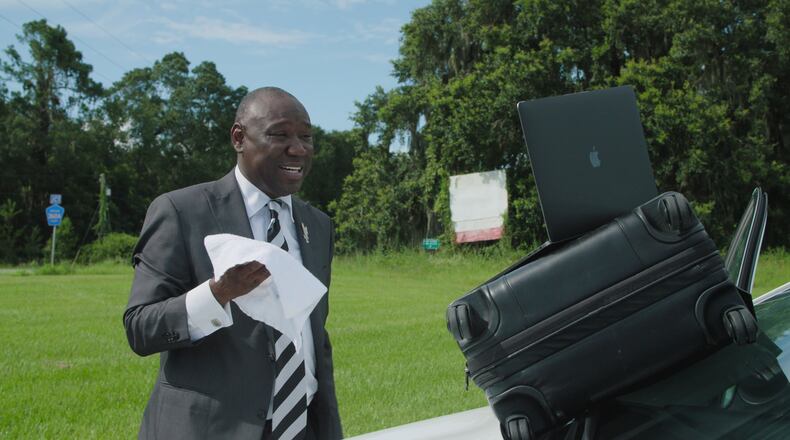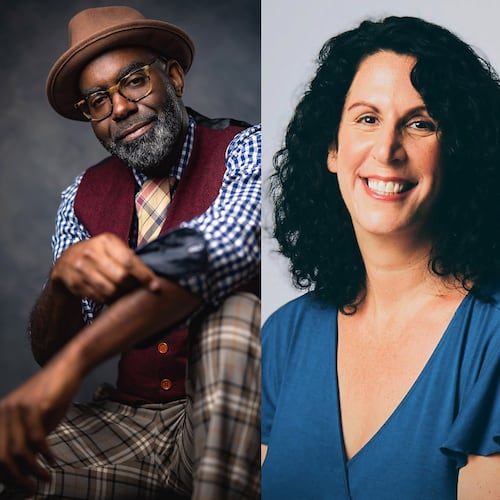Over the past decade, Florida civil attorney Benjamin Crump has become the public face in almost every major case after a Black person is killed by a police officer as the suffering families sought financial retribution.
But who is Crump himself? Critics may paint him as an ambulance-chasing opportunist, but a new Netflix documentary “Civil: Ben Crump” attempts to peel back the layers to reveal his sincere commitment to justice, his empathy for the victims’ families and the genuine danger he places himself and his family in every day. The film came out June 19.
The documentary follows Crump for a year, starting with the 2020 George Floyd murder until the time Floyd’s family receives $27 million from the city of Minneapolis in 2021. The film covers several other cases Crump’s firm dealt with at the time as well. (The trial for the Ahmaud Arbery case in Georgia, in which three men were later convicted of hate crimes, came after filming had ended.)
“black-ish” creator Kenya Barris convinced Crump to allow cameras into his life.
“It was a big decision to pull back the curtains,” said Crump, 52, in an interview with The Atlanta Journal-Constitution. “Not just my professional life but my family. I understood the opportunity with Netflix to use this global bullhorn to speak truth to power. That’s what I’ve always tried to do, arguing in the court of public opinion to influence the court of law. We’re trying to affect hearts and minds of people in judgment of the next Travyon Martin, the next Breonna Taylor, the next George Floyd.”
What the film reveals is how much perpetual strain and burden these cases place on Crump himself. He is seen frequently rubbing his forehead as he listens to one infuriatingly sad story after another.
“I was never aware I was doing that so much until I saw it in the film,” Crump said. “That is clearly a physical manifestation of the mental anguish that I as a human being have to endure.”
“Civil” director Nadia Hallgren, who also directed “Becoming,” a documentary about Michelle Obama, said Crump is a “very restrained individual, very stoic. That’s where the head rubs come in. He has to keep it together in front of these families. He is the rock. When he walks into a room, they are looking to him for answers. "
She had to film very raw moments with Crump counseling grieving family members. But she said they always cooperated. “One of the greatest fears of a family after a tragedy,” Hallgren said, “is their loved ones being forgotten. If there’s an opportunity to keep the story going, to keep their loved one in the consciousness of society, people did not say no.”
Crump also wanted to make it clear that while he is often critiqued from all directions that he is a profiteer, “nobody gets rich doing civil rights law. My colleagues want me to focus on mass torts, environmental cases. That’s what makes the money. I just believe in my heart when I look at my little girl Brooklyn and other young people, we have to fight for them. With America’s radicalization of young white men talking about taking back America, we have to stand up against that. That’s why I continue to do civil rights cases, to fight for the the marginalized, the victimized, the disenfranchised.”
He knows he can’t do this all by himself. This film, he hopes, can be a catalyst for a new generation to handle the workload.
“It’s going to take an army of civil rights attorneys and social justice warriors in every town, in every state to defeat this disease of racism,” he said.
Crump himself was inspired to open his own law firm by Thurgood Marshall, the first Black Supreme Court justice.
He met Marshall in person at age 22 when Marshall told 40 men and women from historically Black colleges that they were destined for great things. Crump now holds similar meetings with aspiring attorneys.
Marshall, Crump said, talked “about staying focused on the mission. People depend on you. You can’t break because that would cause more losses, more deaths.”
Hallgren aired some of the harsh critiques, the death threats Crump receives on a regular basis.
One Fox News host Will Cain in 2021, for instance, dubbed Crump “the most dangerous man in America,” saying he is getting rich off lies.
“I know what the dangers and perils are,” Crump said. “But my wife and kids didn’t choose this. I’m keenly aware of the risks I put them in. But my wife has told me that if I die fighting this mission and leave a better world for our children, then my life would not have been in vain. I pray that never happens but I’m not afraid of doing what I think is right.”
The film also shows some cases that get zero publicity but Crump handles anyway.
He represented a Black woman with young children who was treated with suspicion by a bank teller when she tried to cash a $90 paycheck she needed to pay for milk for her baby. The teller called the cops on her instead.
The twist: the police officers ended up paying for the baby formula. “I’m so happy Nadia showed that,” Crump said. “It’s important to show we are not against police officers. We’re against police officers who shoot us in the back.”
HOW TO WATCH
“Civil: Ben Crump,” available on Netflix
About the Author
Keep Reading
The Latest
Featured



